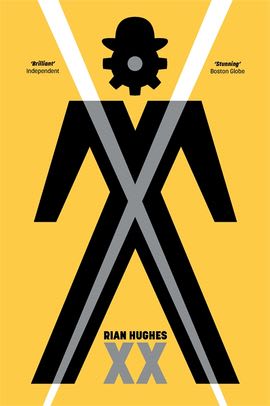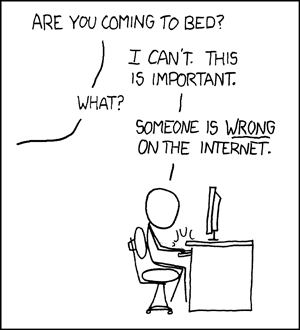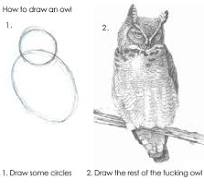Published on January 8, 2025 1:02 PM GMT
SPOILER WARNING: Extensive spoilers for XX.

XX was recommended by one of the comments on my Sci-Fi micro-reviews, so I read it. I can't seem to find any critical reviews of the book online so I'm going to while away a few hours of my life in a misguided attempt to reveal that the emperor has no clothes.

Typography
First let's dispense with XX's most distinguishing feature, then we'll get down to brass tacks. Rian Hughes plays around a huge amount with typography and tries to push the edges of text as a medium. This is an interesting quirk, and is sometimes appreciated, but sometimes makes the novel actively hostile to the reader. Reading through twenty pages of this quickly gets tiring:

Overall, I don't think it added that much to the story, but I guess some people would like it ?.
Length And Pacing
This book is long (978 pages), and slow. It's not without its good bits, but to be blunt, it's a slog. If I appreciate the ideas in a book though, I'm happy to recommend even longer and slower works. So lets move onto:
Ideas
I generally prefer hard sci-fi. Sci-fi that might make up a number of novel technologies, but then applies them consistently and rigorously[1]. Sci-fi that explores ideas in physics,. economic, sociology, philosophy, or whatever.
That said I'm perfectly happy to read science-fantasy. If you want to tell a story set in space, and don't want to worry too much about the annoying physics, then so long as the plot is good I'm all for it.
XX is neither. It tries its hardest to be about high-minded concepts, alternative physics, and philosophy, but every single one of its ideas is completely BS. Let's get started:
The Oxbow:
After a long monologue about how consciousness requires localisation, the protagonist finishes off with:
"We pinch off a piece of the Web, of ideaspace, through a looped buffer - one with a very specific permeability that I've, uh, I've not completely resolved as yet. Connected, so there is a way in, but shielded, cut off from most of the noise of the rest of the internet. This will give any signal in there that may be trying to localise itself a means to cohere. If you're diffused throughout a system like the internet, a system with a billion cameras for eyes and a billion keyboards constantly firing up your nerve signals, you're not going to know where, if anywhere, you are. The net is interconnected; you are the net. There is no not-you.
But inside the Oxbow, it will be able to exist as a dualistic it and not-it - and thus we imbue it with a sense of self."
Given this critical insight he builds some software which magically allows ideas on the internet to become personified as conscious beings, including talking, controlling a 3D printer, and more. This reminds me of the classic meme:

In general I'm fairly forgiving of leaving some details unspecified in sci-fi. After all if you had all the details it wouldn't be fi. But the author does this for pretty much every explanation of anything throughout the book, and yet seems incredibly proud of himself for his high brow philosophical ideas.
For example:
- The signal contains a grid of individuals, therefore whenever you put on AR goggles you see a global 3D grid of alien creatures laid out across the earth.Fundamentally everything is information, therefore Dana can teleport into the grid and back out into physical space wherever she wants.These creatures have direct brain communication abilities, therefore if you're in the same place on earth as a creature is in the grid it can affect you, e.g.making you sleepy.
Signal Compression
The signal is described on page 406 as being 100 trillion digits long, or about 300 trillion bits of information. On the other hand on page 59 it states that the signal contains one section with 760 trillion near repeats of the same data, a direct contradiction.
Either way it contains blueprints for enough individual creatures to fill the entire earth's volume at one creature every 1000 cubic metres[2]. That's one million trillion creatures. There is no possible way to fit that into 300 trillion bits.
The story vaguely implies super advanced compression was used, but this is nonsensical. Firstly because that implies the difference between 2 creatures can be encoded in less than one bit. And secondly because the story clearly states that:
- Each creature is encoded in a separate section with a 3.8 ms pause between the sections.Similar creatures are placed next to each other in the signal.Adjacent creatures share a lot of the same data.
And this is critical to the story, allowing the protagonist to divine the existence and location of a species called the shepherds + compare the data of different creatures to work out where their brain is likely to be encoded for within the section.
Efficient compression requires that the signal should look essentially indistinguishable from noise. Near repeats of the same data is the opposite of compression.
OK. So let's throw out the 100 trillion digits number as pure nonsense. Let's also assume it's not compressed. If each section takes 3.8 ms, receiving one million trillion sections should take about a billion years. I assume that didn't happen.
Neither is each section particularly data rich, containing at most 7 billion digits.
It doesn't matter how you slice it, the author is fundamentally confused about what's actually in the signal.
Moving the grid
The grid includes the entire earth, so what do you do if you want to see a creature 10 thousand miles away and one thousand miles underground?
The protagonist deals with the first by telling his computer he's in a different location, and the second by giving his computer the wrong time. Since the earth orbits around the sun, offsetting the time will also offset the grid by the amount the earth has orbited by then.
Changing time causing the grid to move will only work if there's some absolute frame of reference, something even Galileo knew was wrong.
As for changing the location - there's no way that the grid is using the computers knowledge of its location when deciding what to display in its AR goggles, because its clear that it updates continuously when you move, and GPS is not accurate enough for that. It's clearly using some other method to determine location. Besides if it is using the computers location either the computer knows its altitude, in which case you don't need the time shenanigans, or it doesn't, in which case how come the AR goggles show you the correct creatures when you're flying?
Sentient Galaxies
A central plot point is that the Andromeda galaxy is conscious, the stars that make it up performing a dance that encodes information, thinking slow thoughts over the 10s of thousands of years it takes light to cross the galaxy.
Now the author is right that there's no fundamental reason you couldn't encode a brain in the movements of stars, or in the light that crosses between them, but expecting a galaxy to spontaneously be conscious is no different from expecting a watch to spontaneously arise out of a tornado running through a garbage heap. Evolution is required to craft consciousness, and galaxies don't reproduce.
The signal as a virus
Somehow or other the signal hijacks whatever brain/computer/whatever which stores it, allowing it to control the host, up to and including such diverse creatures as Algae and sentient stars.
Whilst viruses are of course possible, medium independent viruses are not. For any given virus the vast majority of information processing devices will treat the virus as nothing but noise. A virus must be carefully crafted for the particular processors that will run it. Is the amount of diversity in the galaxy so low that you can craft a virus that will affect nearly every species? You know what, I'll let this one pass, this is probably the most reasonable idea in the book.
Alternative physics
The author spends some time crafting an alternative theory of physics where redshift is caused not by the universe expanding but by everything in the universe shrinking. Now I don't have the tools to evaluate this, but as far as I can tell it's not based on any existing theories, and I'm nearly certain it doesn't stand up to scrutiny. It's completely irrelevant to the plot, and so as far as I can see the only reason for the author to add it in is to show off how clever he is for making up superficially plausible BS physics.
Conclusion
I'm not trying to nitpick here. Nearly all sci-fi books contain some amount of mumbo-jumbo, handwaving, and contradictions. But their good points tend to make up for those.
XX has nothing. It's long, slow, has an awful plot, and doesn't have a single idea that stands up to scrutiny. And it's constantly sounding awfully smug about giving you a bunch of philosophy 101 lessons.
2/10, would not recommend.
- ^
Ted Chiang is a master of the short story in this genre.
- ^
The creatures are on a cubic grid about 10 metres apart. Whilst there are places it isn't this regular, and there's entirely missing sections, it's clear from the story these aren't enough to impact this by more than an order of magnitude.
Discuss

